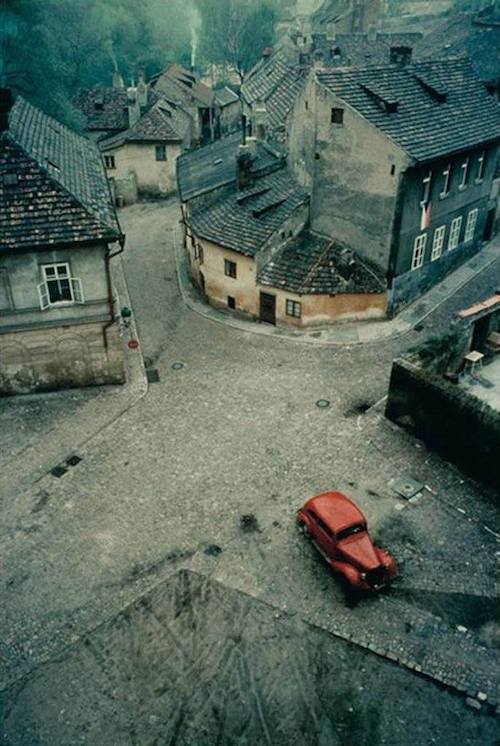
Franco Fontana Prague 1967

The wonderful world of junk.
• Junk Bond Market Still in Total Denial, Fighting the Fed (WS)
The Fed’s efforts to raise interest rates across the spectrum have borne fruit only in limited fashion. In the Treasury market, yields of longer-dated securities have not risen (prices fall when yields rise) as sharply as they have with Treasuries of shorter maturities. The two-year yield has surged to 2.41% on Tuesday, the highest since July 2008. But the 10-year yield, at 2.82%, while double from two years ago, is only back where it had been in 2014. So the difference (the “spread”) between the two has narrowed to just 0.41 percentage points, the narrowest since before the Financial Crisis:
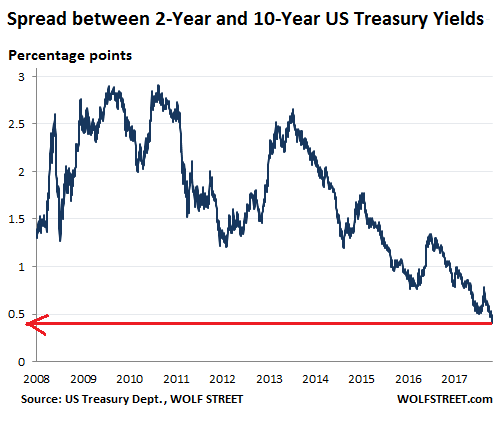
This disconnect is typical during the earlier stages of the rate-hike cycle because the Fed, through its market operations, targets the federal funds rate. Short-term Treasury yields follow with some will of their own. But the long end doesn’t rise at the same pace, or doesn’t rise at all because there is a lot of demand for these securities at those yields. Investors are “fighting the Fed”— doing the opposite of what the Fed wants them to do – and the difference between the shorter and longer maturities dwindles, and it dwindles, and it causes a lot of gray hairs, and it dwindles further, until it stops making sense to investors and they open their eyes and get out of the chase, and suddenly long-term yield surge higher, as bond prices drop sharply.
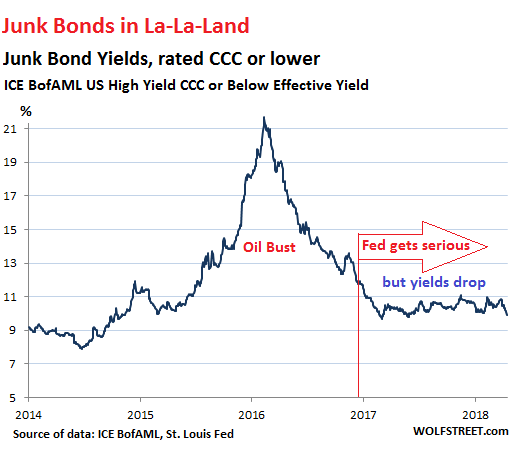
That’s why short sellers have taken record positions against the 10-year Treasury recently: they’re waiting for yields to spike to the next level. But this disconnect – this symptom of investors fighting the Fed – in the Treasury market is mild compared to the disconnect in the junk bond market. There, investors have completely blown off the Fed. At least in the Treasury market, 10-year yields have risen since the Fed started getting serious about rate increases in December 2016. In the junk bond market, yields have since fallen. In other words, despite the Fed’s tightening, the junk bond bubble has gotten bigger. And investors are not yet showing any signs of second thoughts.
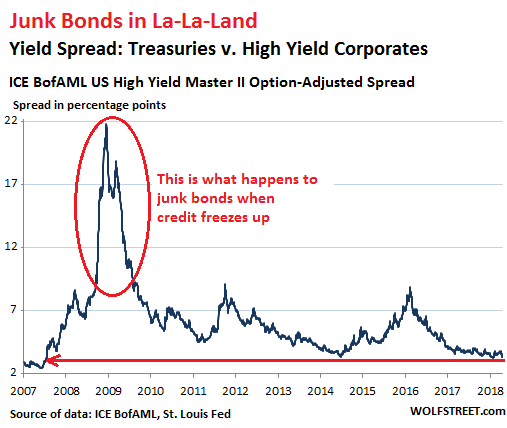

Because the IMF made sure it would be skewed towards the rich.
• World Trade System In Danger Of Being Torn Apart, Warns IMF (G.)
The postwar global trading system risks being torn apart, the International Monetary Fund has warned, amid concern over the tariff showdown between the US and China. In a sign of its growing concern that protectionism is being stimulated by voter scepticism, the IMF used its half-yearly health check for the world economy to tell policymakers they needed to address the public’s concerns before a better-than-expected period of growth came to an end. Maurice Obstfeld, the IMF’s economic counsellor, said: “The first shots in a potential trade war have now been fired.” He said Donald Trump’s tax cuts would suck imports into the US and increase the size of the trade deficit 2019 by $150bn – a trend that could exacerbate trade tensions.
“The multilateral rules-based trade system that evolved after world war two and that nurtured unprecedented growth in the world economy needs strengthening. Instead, it is in danger of being torn apart.” Obstfeld said there was more of a “phoney war” between the US and China than a return to the widespread use of tariffs in the Great Depression, but that there were signs that even the threat of protectionism was already harming growth. “That major economies are flirting with trade war at a time of widespread economic expansion may seem paradoxical – especially when the expansion is so reliant on investment and trade,” Obstfeld added.

Too much surplus?
• Eurozone Engine Sputters as German Downturn Risk Sharpens (BBG)
The euro area’s economic expansion is standing on increasingly shaky ground after reports showed German investor confidence tumbling to its lowest level since late 2012 and the risk of a recession in the nation jumping. The sentiment gauge from ZEW showed more investors now see a worsening in Europe’s largest economy than forecast an improvement, a mood swing that ZEW President Achim Wambach blamed on the U.S. trade dispute combined with weak domestic retail and production numbers. The drop in confidence came as the Dusseldorf-based Macroeconomic Policy Institute (IMK) said the probability of a recession in Germany over the next three months has jumped to 32%.
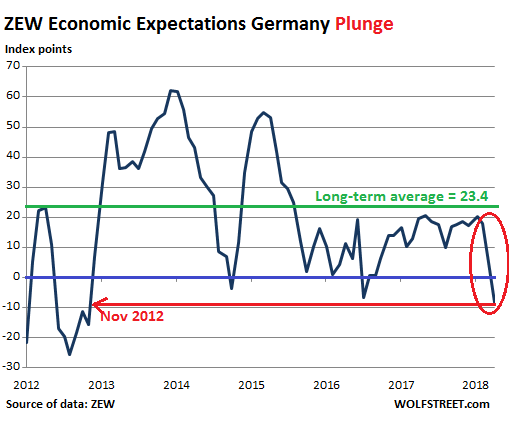
While that outcome remains unlikely, the gauge is up sharply from 6.8% in March. It follows U.S. attempts to rewrite international trade rules by imposing import tariffs, triggering a tit-for-tat response by China. Even though the European Union has temporarily been exempted from the metal levies, risks of far-reaching retaliatory measures could still hurt Germany’s export-driven economy – feeding into signs that growth in the euro area is coming off its peak. At the IMK, the recession gauge, which uses data that have signaled downturns in the past is now orange – the middle of its traffic-light warning system – for the first time since March 2016. That was just as the German economy was entering a mild slowdown.
“Volatility in financial markets, which has been evident for several months, is now accompanied by a noticeable deterioration in sentiment and subdued production,” according to IMK. “This has recently become a typical constellation for the end phase of a cycle.”
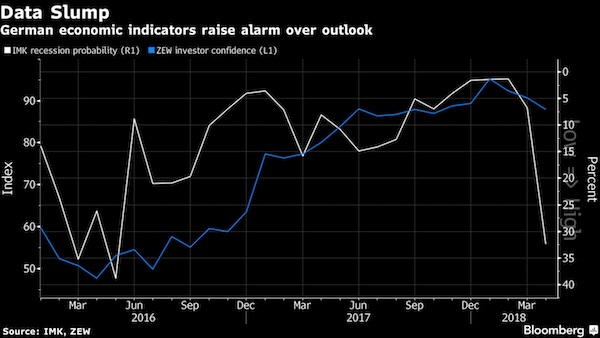

For now, still a casino.
• Bitcoin Tumbles After Mystery “Whale” Dumps $50 Million In One Trade (ZH)
The price of several cryptocurrencies took a sudden hit Tuesday over the course of 20 minutes, which some suspect may be the result of a single Bitcoin whale who unloaded over $50 million worth of the digital currency in one Bitfinex trade. The drop comes one day after the third largest bitcoin wallet also unloaded around $50 million of the digital currency. As Marketwatch first noted , “the balance of wallet 3D2oetdNuZUqQHPJmcMDDHYoqkyNVsFk9r — an anonymous digital account which is valued at $1.49 billion — fell by 6,500 bitcoin Tuesday, with the average sale price sale being $8,146.70, a total value of just over $50 million, according to bitinfocharts.”
The sale comes a day after the third-largest wallet, which famously purchased over $400 million in bitcoin in February, let go of 6,600 bitcoin at an average price of $8,026. Combined, the two whales unloaded over $100 million of bitcoin within 24 hours. As there was no immediate news or catalyst, some attributed the sale to Tuesday’s report that New York Attorney General Eric Schneiderman had launched an investigation into 13 cryptocurrency exchanges including Coinbase, Gemini and Bit Trust. The probe seeks information on fees, volume data and procedures governing margin trading among other things. However, the news hit some 4 hours prior to the sale.
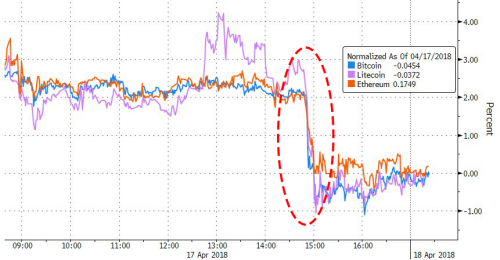

Unintended sanctions consequences?! Aluminum much more expensive for US firms too.
• Japan Asks Rusal To Stop Aluminum Shipments (ZH)
One week ago, when the Trump administration unveiled the most draconian Russian sanctions yet which among others targeted Putin-ally Oleg Deripaska and the Russian oligarch’s aluminum giant, Rusal, we said that aluminum prices are going higher, much higher, for one reason: excluding China’s zombie producers, Rusal is the world’s largest producer of aluminum. Well, prices have since surged, largely as expected, and one week later we also learned just how “radioactive’ Rusal’s products have become as a result of the US sanctions: overnight Reuters reported that major Japanese trading houses asked the Russian aluminum producer to stop shipping refined aluminum and other products in light of U.S. sanctions on the world’s No.2 producer and are scrambling to secure metal elsewhere, according to industry sources.
“We have requested Rusal stop shipments of aluminum for our term contracts as we can’t make payment in U.S. dollars and we don’t want to take the risk of becoming a secondary sanction target by the United States,” said a source at a trading house [..] It is unclear how and where Japan can find alternative sources of aluminum: Japan buys about 300,000 tonnes of refined aluminum from Russia, about 16% of the nation’s total import, according to the Japan Aluminium Association. “Everyone has been on a search for substitutes and that pushed local spot premiums to around $200-$250 per tonne by last Friday,” he said. That’s sharply higher than Japan term premiums for April-June quarter shipments at $129 per tonne.
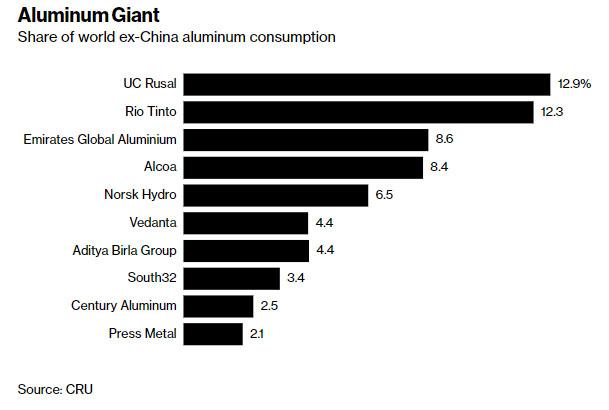

Pearson Sharp and Robert Fisk were both on the ground in Douma. Both say the same.
• The Deep State And The Big Lie – Douma (Stockman)
The contra-narrative about Assad’s alleged gas attack is gaining traction as the evidence comes in. It increasingly seems probable that some folks suffocated or were overcome with smoke inhalation and hypoxia (oxygen deprivation) when buildings, tunnels and underground bunkers collapsed into clouds of dust during the final battle for Douma last Saturday. Then the desperate remnant of the jihadist Army of Islam (Jaysh al-Islam) holed up there piled the bodies in a basement, spread shaving cream on their lips and proceeded to videotape furiously. Thereafter, they charged into a nearby hospital (which was treating hypoxia victims) with their video cameras in hand, yelling “chemical attack” while water-hosing one and all, thereby setting off the pandemonium seen on social media around the world.
We haven’t gotten to Douma yet to check out this contra-narrative, but an intrepid young reporter named Pearson Sharp did. Along with his camera crew, he visited the site of the attack, the hospital and the nearby rebel weapons dump – and interviewed dozens of people in the immediate vicinity. According to Sharp, none of them witnessed the alleged gas attack or believed it happened, and several personnel at the Douma hospital corroborated the phony water-dousing melee. Indeed, the head surgeon insisted to him that no one had died at the hospital from chemical agents. And he also saw and videoed room after room stacked with rockets, mortars and other military gear and filmed the debris and dilapidated remnants of buildings in the town.
[..] Self-evidently, a visiting Martian might have an altogether different interpretation of which nation had ventured down the “dark path” and which one was a “force for stability and peace”. And that would especially be the case with just a few more reports like the new missive from veteran war correspondent, Robert Fisk of the Independent (UK). Unlike young Mr. Pearson Sharp, Fisk has been a war correspondent in the Middle East for four decades and has won endless awards for reporting from the front lines. But his chops were earned when he became one of the few reporters in history to conduct face-to-face interviews with Osama bin Laden on three separate occasions during the 1990s.
Fisk’s dispatch filed Monday night speaks for itself and merits quoting at length because it not only skewers Washington’s narrative about Assad’s gas attack, but also provides vivid context: Whatever happened last Saturday erupted in the fog of war and could not possibly have been instantly assessed objectively or correctly by officials 6,000 miles away, who admit to having no “assets” on the ground in Damascus.

Yes, this is pretty crazy.
• Theresa May’s Husband Made A Killing From The Bombing Of Syria (EP)
The fact that Philip May is both a Senior Executive of a hugely powerful investment firm, and privy to reams of insider information from the Prime Minister – knowledge which, when it becomes public, hugely affects the share prices of the companies his firm invests in – makes Mr May’s official employment a staggering conflict of interest for the husband of a sitting Prime Minister. However, aside from the ease at which he is able to glean insider information from his wife about potential decisions which could go on to make huge profits for his firm, there is a far darker conflict of interest that has so far gone undiscussed.
Philip May is a Senior Executive of Capital Group, an Investment Firm who buy shares in all sorts of companies across the globe – including thousands of shares in the world’s biggest Defence Firm, Lockheed Martin. According to Investopedia, Philip May’s Capital Group owned around 7.09% of Lockheed Martin in March 2018 – a stake said to be worth more than £7Bn at this time. Whilst other sources say Capital Group’s shareholding of Lockheed Martin may actually be closer to 10%. On the 14th April 2018, the Prime Minister Theresa May sanctioned British military action on Syria in response to an apparent chemical attack on the city of Douma – air strikes that saw the debut of a new type of Cruise Missile, the JASSM, produced exclusively by the Lockheed Martin Corporation.
The debut of this new – and incredibly expensive – weapon was exactly what US President Donald Trump was referring to when he tweeted that the weapons being fired on Syria would be “nice and new and ‘smart!’” Every single JASSM used in the recent bombing of Syria costs more than $1,000,000, and as a result of their widespread use during the recent bombing of Syria by Western forces, the share price of Lockheed Martin soared.

Now let them tell Erdogan about it.
• Trump Tweets Support For American Pastor On Trial In Turkey (R.)
U.S. President Donald Trump voiced his support on Tuesday for Pastor Andrew Brunson, who is on trial in Turkey on charges he was linked to a group accused of orchestrating a failed 2016 military coup, in a case that has compounded strains in U.S.-Turkish relations. “Pastor Andrew Brunson, a fine gentleman and Christian leader in the United States, is on trial and being persecuted in Turkey for no reason,” Trump tweeted. “They call him a spy, but I am more a spy than he is. Hopefully he will be allowed to come home to his beautiful family where he belongs!” Brunson, a Christian pastor from North Carolina who has lived in Turkey for more than two decades, was indicted on charges of helping the group that Ankara holds responsible for the failed 2016 coup against President Tayyip Erdogan.
He faces up to 35 years in prison. Brunson has been the pastor of Izmir Resurrection Church, serving a small Protestant congregation in Turkey’s third largest city. Brunson’s trial is one of several legal cases roiling U.S.-Turkish relations. The two countries are also at odds over U.S. support for a Kurdish militia in northern Syria that Turkey considers a terrorist organization. Washington has called for Brunson’s release while Erdogan suggested last year his fate could be linked to that of U.S.-based Muslim cleric Fethullah Gulen, whose extradition Ankara has repeatedly sought to face charges over the coup attempt.

It’s the EU that demanded refugees would be confined to the islands.
• New Refugees In Greece Can Move Freely, Says Court (K.)
New refugee and migrant arrivals in Greece will soon be able to move around the country freely without being restricted to the islands of the eastern Aegean where they arrive from neighboring Turkey, according to a Council of State ruling that emerged on Tuesday and upends a 2016 decision by the Greek asylum service that forced them to remain in so-called hotspots until their asylum application was processed. According to the leaked ruling by the country’s highest administrative court, there are no reasons of public interest or migration policy to justify their geographical restriction to the islands of Lesvos, Chios, Samos, Leros, Kos and Rhodes.
Migration Policy Minister Dimitris Vitsas said he would comment on the ruling once he is informed of it officially. Once the ruling is published, new refugees who apply for asylum will be allowed to reside in any part of the country they choose. The asylum service’s May 2016 decision restricting migrants to the Aegean islands was challenged by the Greek Council for Refugees, an NGO which filed an appeal for its cancellation. “The imposition of restrictions on movement blocked the distribution of those people throughout Greek territory and resulted in their unequal concentration in specific regions and the significant burdening and decline of those regions,” the court said in its reasoning.
However, taking into account the large number of arrivals, the court said the ruling does not have a retroactive effect, which means it will not relate to the refugees who are already languishing in reception centers. The so-called hotspots have been operating beyond capacity and the country is now witnessing a fresh spike in arrivals of often flimsy boats carrying desperate passengers from Turkey.

Indeed. But plastics are a huge industry.
• Recycling Is Not The Answer (G.)
We all know, in theory, that we ought to use less plastic. We’ve all been distressed by the sight of Blue Planet II’s hawksbill turtle entangled in a plastic sack, and felt chastened as we’ve totted up our weekly tally of disposable coffee cups. But still, UK annual plastic waste is now close to 5m tonnes, including enough single-use plastic to fill 1,000 Royal Albert Halls; the government’s planned elimination of “avoidable” plastic waste by 2042 seems a quite dazzling task. It was reported this week that scientists at the University of Portsmouth have accidentally developed a plastic-eating mutant enzyme, and while we wait to see if that will save us all, for one individual the realisation of just how much plastic we use has become an intensely personal matter.
One early evening in mid-2016, Daniel Webb, 36, took a run along the coast near his home in Margate. “It was one of those evenings where the current had brought in lots of debris,” he recalls, because as Webb looked down at the beach from his route along the promenade he noticed a mass of seaweed, tangled with many pieces of plastic. “Old toys, probably 20 years old, bottles that must have been from overseas because they had all kinds of different languages on them, bread tags, which I don’t think had been used for years …” he says. “It was very nostalgic, almost archaeological. And it made me think, as a mid-30s guy, is any of my plastic out there? Had I once dropped a toy in a stream near Wolverhampton, where I’m from, and now it was out in the sea?”
Webb decided that he would start a project to keep all the plastic he used in the course of an entire year. He would not modify his plastic consumption in that time (although he had already given up buying bottled water), and each item would be carefully washed and stored in his spare room.
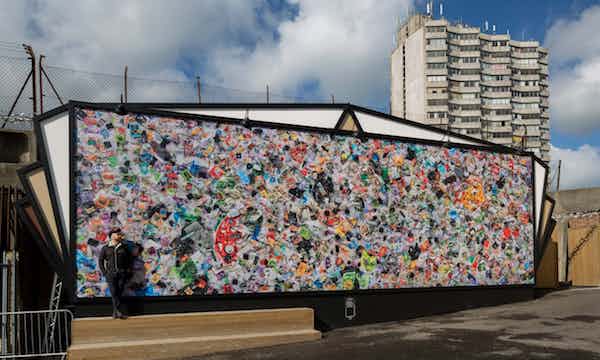
Daniel Webb in front of his Mural-by-the-Sea. Photo: Ollie Harrop 2018/Everyday Plastic

Where your plastic ends up. Never again can you say you didn’t know. From now on it’s you didn’t care.
• 30 Kilos Of Plastic Bags Killed Whale Washed Ashore On Santorini (KTG)
More than 30 kg of plastic, mainly plastic bags, were found in the stomach of the whale that was washed out on the island of Santorini last week. The conducted autopsy showed that the huge mammal died of a gastric shock. The whale was unable to digest or excrete the rubbish through its digestive system. The problem caused peritonitis inflammation in its intestines that led to the animal’s death, local media report. The dead whale brings back to the spotlight the problem of tonnes of plastic landing into the waters, polluting the environment and leading to death of marine life. The body of the 9-meter long sperm whale – or Physeter macrocephalus as the scientific name is – was washed ashore on Akrotiri area on the island of Santorini in the Aegean island group of Cyclades on April 10th. The body weighting more than 7 tones was in condition of advanced sepsis.









Home › Forums › Debt Rattle April 18 2018